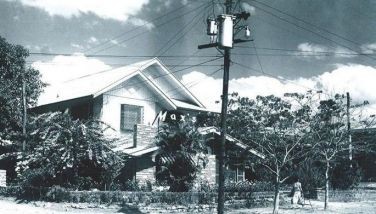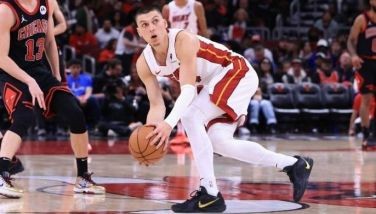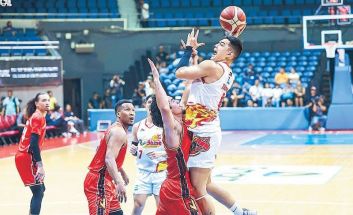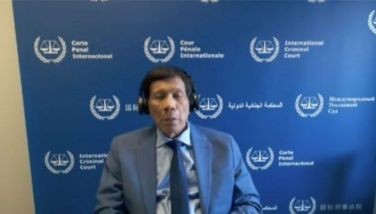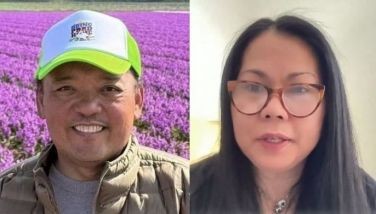Basketball English
May 29, 2004 | 12:00am
Don’t worry. It’s not a new language, and it isn’t a course that’s going to be required in high schools or colleges soon. It’s a new means of communication for coaches and scouts as they travel to Asia and Europe in search of NBA talent.
Last week, four of the Philippines’s most promising ballers were sent to the adidas Superstar Camp near Shanghai, China, as part of their training as future pros. John Carlos Hermida, Paul Joseph Sorongon, Ken Joseph Barracoso and Paul Christian Zamar were among 50 high school-age players from Asia and Australia to take part in the camp. They were trained by coaches from most of the countries participating, as well last year’s NBA Most Improved Player awardee Gilbert Arenas of the Washington Wizards and 16-year NBA veteran Detleft Schrempf.
One of the new courses in the camp was "Basketball English," a series of lessons designed by Dr. Alan Juffs, chairman of the Department of Linguistics at the University of Pittburgh. Juffs, who has a Ph.D in linguistics, has spent more than 20 years teaching in France, China, Japan, Canada and the United Kingdom, and is fluent in English, French, German and Mandarin.
"NBA scouts and coaches travel to China more and more, because their players are really tall," explains Good Custodio of adidas Philippines marketing. True enough, more than half of the participants stood over two meters tall (6’7"). "Basketball English is a way to help them understand the meaning of certain technical terms to make their transitions to American basketball easier."
As illustrated by the experience of past Chinese national players like Wang Zhizhi and Yao Ming, the language barrier is the single biggest barricade to fully progressing as a basketball player. And basketball in itself is a technical language that is difficult to translate. Since it is next to impossible to master the English language as a whole in a matter of days, Juffs designed the crash course in basketball English. This way, players will recognize the meaning of terms like "pick and roll" and "triple-threat position" with great ease, and coaches will more easily be able to integrate foreign players into their plays.
"The goal of these four lessons is to present to participants in the camp some essential terminology and cultural elements unique to basketball," Juffs explains in his introduction. "Participants will review basic English clause structure and focus on the pronunciation of select sounds that cause particular difficulty for communication."
Initially, the course aims to make non-English-speaking players familiar with about 10-15 critical basketball terms, and respond to frequently asked questions. When they are more comfortable with the terms used, the students then move on to awareness of cultural differences with English-speaking countries. Some topics covered include differences in personal space; how to appear confident but not arrogant; when humor and criticism are appropriate; and sensitivity to negative comments on race (ethnicity) and gender. Sounds pretty complex for a four-day class. Juffs was paired with Lawrence Norman of adidas. Norman has an MBA from Clark University, played professional basketball internationally for four years, and has been both an NCAA player and coach.
"Language learning is understood to be most successful when instruction is linked to specific real-world tasks that language learners will have to carry out," Juffs adds. "In addition, by linking language use closely to physical activity, the lessons draw on aspects of the technique known as Total Physical Response." In short, the students absorb the nuances of the language better through seeing the applications and doing it themselves.
"One thing I noticed about the way Prof. Juffs teaches is that he doesn’t embarrass the kids," Custodio adds. "In Asia, we’re very sensitive to loss of face, o napapahiya. But even when a student can’t get it right, Juffs is very encouraging, and the players also become encouraging to each other."
On day one, the participants tackle terms for offense in basketball. They have a list of target vocabulary words to learn, as well as the proper grammatical use for the terms. For example, making any offensive move often uses the verb "to be" and declarative sentences. Difficulties here include differentiating from left and right in English, punctuation, and the use of contractions like "I’m" or "he’s" and so on.
On day two, the more difficult terms for defense are studied. Trash talking is part of the lesson, and sometimes, the attempt to transfer the meaning of some of the terms into other languages can be amusing. The subjective meanings can be difficult to interpret. How does one say "If you can’t stand the heat, stay out of the kitchen," in another language without becoming literal?
On day three, the players are given their first lessons in dealing with the media and handling interviews and post-game press conferences. The players learn how to differentiate yes or no questions from more detailed ones, and how to express the emotions they experienced while the game was going on.
"Some of these kids are really talented," the 6’3" Arenas adds, noting how most of the participants towered over him. "We’re having a good time here teaching them."
A few years down the road, some of these players will have a much smoother transition to the NBA. And this is where it all started, with help from some basketball English.
The Basketball Show will be celebrating its third anniversary starting in June. Catch this week’s episode at 3 p.m. over ABC 5. The Basketball Show is supported by adidas, V-Fresh, Nissan and Air 21.
Last week, four of the Philippines’s most promising ballers were sent to the adidas Superstar Camp near Shanghai, China, as part of their training as future pros. John Carlos Hermida, Paul Joseph Sorongon, Ken Joseph Barracoso and Paul Christian Zamar were among 50 high school-age players from Asia and Australia to take part in the camp. They were trained by coaches from most of the countries participating, as well last year’s NBA Most Improved Player awardee Gilbert Arenas of the Washington Wizards and 16-year NBA veteran Detleft Schrempf.
One of the new courses in the camp was "Basketball English," a series of lessons designed by Dr. Alan Juffs, chairman of the Department of Linguistics at the University of Pittburgh. Juffs, who has a Ph.D in linguistics, has spent more than 20 years teaching in France, China, Japan, Canada and the United Kingdom, and is fluent in English, French, German and Mandarin.
"NBA scouts and coaches travel to China more and more, because their players are really tall," explains Good Custodio of adidas Philippines marketing. True enough, more than half of the participants stood over two meters tall (6’7"). "Basketball English is a way to help them understand the meaning of certain technical terms to make their transitions to American basketball easier."
As illustrated by the experience of past Chinese national players like Wang Zhizhi and Yao Ming, the language barrier is the single biggest barricade to fully progressing as a basketball player. And basketball in itself is a technical language that is difficult to translate. Since it is next to impossible to master the English language as a whole in a matter of days, Juffs designed the crash course in basketball English. This way, players will recognize the meaning of terms like "pick and roll" and "triple-threat position" with great ease, and coaches will more easily be able to integrate foreign players into their plays.
"The goal of these four lessons is to present to participants in the camp some essential terminology and cultural elements unique to basketball," Juffs explains in his introduction. "Participants will review basic English clause structure and focus on the pronunciation of select sounds that cause particular difficulty for communication."
Initially, the course aims to make non-English-speaking players familiar with about 10-15 critical basketball terms, and respond to frequently asked questions. When they are more comfortable with the terms used, the students then move on to awareness of cultural differences with English-speaking countries. Some topics covered include differences in personal space; how to appear confident but not arrogant; when humor and criticism are appropriate; and sensitivity to negative comments on race (ethnicity) and gender. Sounds pretty complex for a four-day class. Juffs was paired with Lawrence Norman of adidas. Norman has an MBA from Clark University, played professional basketball internationally for four years, and has been both an NCAA player and coach.
"Language learning is understood to be most successful when instruction is linked to specific real-world tasks that language learners will have to carry out," Juffs adds. "In addition, by linking language use closely to physical activity, the lessons draw on aspects of the technique known as Total Physical Response." In short, the students absorb the nuances of the language better through seeing the applications and doing it themselves.
"One thing I noticed about the way Prof. Juffs teaches is that he doesn’t embarrass the kids," Custodio adds. "In Asia, we’re very sensitive to loss of face, o napapahiya. But even when a student can’t get it right, Juffs is very encouraging, and the players also become encouraging to each other."
On day one, the participants tackle terms for offense in basketball. They have a list of target vocabulary words to learn, as well as the proper grammatical use for the terms. For example, making any offensive move often uses the verb "to be" and declarative sentences. Difficulties here include differentiating from left and right in English, punctuation, and the use of contractions like "I’m" or "he’s" and so on.
On day two, the more difficult terms for defense are studied. Trash talking is part of the lesson, and sometimes, the attempt to transfer the meaning of some of the terms into other languages can be amusing. The subjective meanings can be difficult to interpret. How does one say "If you can’t stand the heat, stay out of the kitchen," in another language without becoming literal?
On day three, the players are given their first lessons in dealing with the media and handling interviews and post-game press conferences. The players learn how to differentiate yes or no questions from more detailed ones, and how to express the emotions they experienced while the game was going on.
"Some of these kids are really talented," the 6’3" Arenas adds, noting how most of the participants towered over him. "We’re having a good time here teaching them."
A few years down the road, some of these players will have a much smoother transition to the NBA. And this is where it all started, with help from some basketball English.
BrandSpace Articles
<
>
- Latest
- Trending
Trending
Latest
Trending
Latest
Recommended












